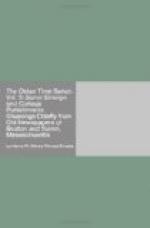-------------------------
NEW ENGLAND IN 1686.
John Dunton, writing from Boston in 1686 to his friends in England, quotes some of the Province laws then in force. He says:—
For being drunk they either Whip or impose a Fine of Five shillings; And yet, notwithstanding this Law, there are several of them so addicted to it that they begin to doubt whether it be a Sin or no, and seldom go to Bed without Muddy Brains.
For Cursing and Swearing they
bore through the Tongue with a hot
Iron.
For kissing a woman in the Street, though but in way of Civil Salute, Whipping or a Fine (Their way of Whipping Criminals is by Tying them to a Gun at the Town House, and when so Ty’d whipping them at the pleasure of the Magistrate and according to the Nature of the Offence).
For Adultery they are put
to Death, and so for Witchcraft, For
that, there are a great many
Witches in this Country &c.
Scolds they gag and set them at their own Doors, for certain hours together for all comers and goers to gaze at. Were this a Law in England and well Executed it wou’d in a little Time prove an Effectual Remedy to cure the Noise that is in many Women’s heads.
Stealing is punished with Restoring four-fold if able; if not, they are sold for some years, and so are poor Debtors. I have not heard of many Criminals of this sort. But for Lying and Cheating they out-vye Judas and all the false other cheats in Hell. Nay, they make a Sport of it: Looking upon Cheating as a commendable Piece of Ingenuity, commending him that has the most skill to commit a piece of Roguery; which in their Dialect (like those of our Yea-and-Nay-Friends in England) they call by the genteel Name of Out-Witting a Man and won’t own it to be cheating.
After mentioning the case of a man in Boston who bought a horse of a countryman who could not read and gave him a note payable at the “Day of the Resurrection,” etc. Dunton goes on to say: “In short, These Bostonians enrich themselves by the ruine of Strangers, etc.... But all these things pass under the Notion of Self-Preservation and Christian Policy.”
It would hardly be fair to quote all this from Dunton’s letters unless we added what he says of Boston in another place; namely, “And though the Generality are what I have described them, yet is there as sincere a Pious and truly Religious People among them as is any where in the Whole World to be found.”




